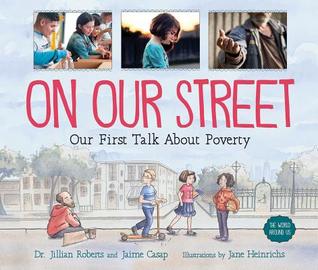Written by Dr. Jillian Roberts and Jaime Casap
Illustrated by Jane Heinrichs
Published February 13, 2018
Why we chose this book:
Living in Worcester, we frequently pass people on street corners who hold signs asking for help. T has been noticing them and asking why they are there. When I saw this book and read its synopsis, I thought it could be a useful tool in answering his questions. I requested a review copy from Orca Book Publishers and they provided it.
Mom's Review
A straightforward, age-appropriate explanation of what poverty and homelessness are. This is intended for ages 5-8 and minimal editing made it accessible to T, who is 3.
On Our Street starts out with an encouragement to ask questions about situations you don't understand. Two girls pass a man sleeping on the sidewalk and talk about why he is there. An unseen narrator answers, using photographs and straightforward language, without however oversimplifying a challenging topic. The initial answer leads the girls to ask further questions, which are answered in the same manner. Content in the margins provides further definitions, resources on human rights, introductions to organizations fighting poverty, as well as pertinent quotes. Suggestions for helping refugees, those who are impoverished, or those experiencing homelessness are also included. By the end, the reader will likely have an understanding of the impact of natural disasters, mental illness, and war. This has indeed been a helpful tool in answering T's questions. On Our Street is compassionate, respectful, and honest.
I liked this book. It's the help I've been wanting in tackling a topic that is difficult for T to understand. Why doesn't everyone have a safe home to live in? It doesn't make sense, and T, like many kids, is not willing to accept things that make no sense. As a three year old, he's always gotten help when he needs it. And why shouldn't the impoverished simply be provided with the help they need? Then everything would be all better, right? I don't want to shatter T's positive impression of the world, but I also don't want to avoid problems we need to solve. This book has been a good fit for us.
Son's Review
(age 3)
While reading:
Son: What does [homeless] mean?
Mom: It means that they don't have homes to live in; they could get sick from being outside all the time. Does that answer your question?
Son: It does. What are community shelters?
Mom: That's a good question. That's a place where people who don't have a home can go and live for a while. The book says that it is a place that provides food and shelter.
Son: Is it a home?
Mom: It's like a big home for lots of families.
____________________________________
Mom: What if you met a child who was homeless? Would you invite them over?
Son: I'd be friends. Yeah. To just live here.
____________________________________
Son: What's a foster home?
Mom: It's a new home with new parents who will take care of you if your usual parents can't take care of you. I knew another teacher who took care of one of her students when his mommy couldn't any more. His teacher was his foster mommy.
Later in the day:
Son, spontaneously to Dad: Some people live on the street also.
Dad: That doesn't sound so good. What if you had to live outside right now in the rain?
Son: I wouldn't like it.
Dad: What do you think would be difficult about not having a home?
Son: Not having dishes.
Mom: How could you help someone who is homeless?
Son: I could make my home into their home.
Mom, to Dad: We talked earlier about if he had a friend who was homeless, T said he'd invite them to live with us.
Dad: Did you learn anything from the book, T?
Son: That some people live on the street.

Comments
Post a Comment